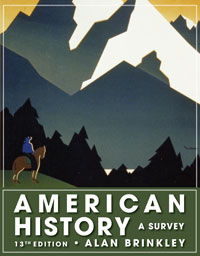American History: A Survey (Brinkley), 13th EditionChapter 22:
THE NEW ERA Main themes of Chapter Twenty-two: - The effect of the automobile boom and various technological breakthroughs on the economic expansion and agricultural malaise of the 1920s
- The attempt by businesses to craft a system of "welfare capitalism," and the reasons for its ultimate failure
- The emergence of a nationwide consumer-oriented and communication-linked culture, and its effect on society and the "new woman"
- The disenchantment of many artists and intellectuals with postwar life, and the broad cultural conflicts over ethnic and religious concerns that plagued the New Era
- The ardently pro-business administrations of Warren Harding and Calvin Coolidge, which, despite their dissimilar personalities, followed a very similar course
A thorough study of Chapter Twenty-two should enable the student to understand the following:- The reasons for the New Era industrial boom after the initial period of economic readjustment following World War I
- The nature and extent of labor's problems in the New Era, particularly with regard to "welfare capitalism"
- The plight of the American farmer in the face of agriculture conglomeration and advancing technology
- The changes in the American way of life and American values in the 1920s in the areas of consumerism, communications, religion, and the role of women
- The reflection of and reaction to these changed values in American literature and art
- The effects of prohibition on American politics and society
- The reasons for xenophobia and racial unrest in the 1920s, and the religious controversies that dominated the era
- The debacle of the Harding administration, and the pro-business tendencies of all Republican administration in the 1920s
 | 




